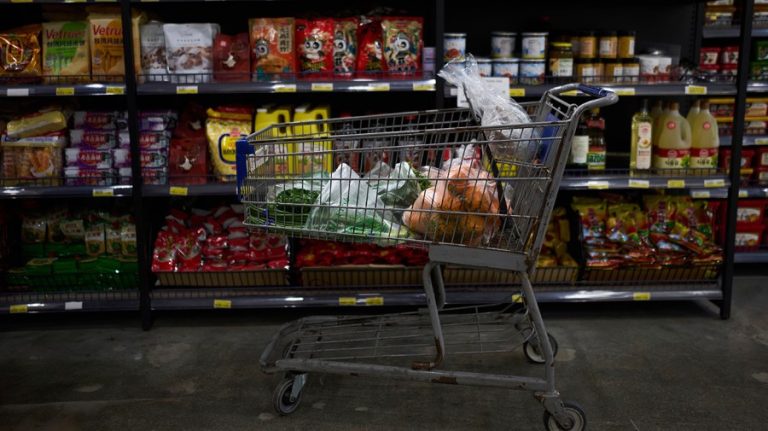The battle over food stamps has emerged as the latest flashpoint in the fierce partisan clash over government spending.
Republicans in Congress are increasingly highlighting the imminent shortfall facing the Supplemental Nutrition Assistance Program (SNAP) in a bid to pressure Democrats to help end the ongoing shutdown. They say Democrats, by opposing the GOP’s stopgap spending bill, are threatening undue harm to some of the nation’s poorest people.
Democrats have countered with charges of hypocrisy, noting the Republicans’ long history of seeking to dismantle federal programs benefiting low-income people, including SNAP. They’re pointing, as recent evidence, to the steep cuts to SNAP adopted this year as part of President Trump’s “big, beautiful bill.”
The impasse is well-entrenched and the impacts on SNAP are already surfacing, as some states have stopped accepting new applications and others are warning that funding for benefits will dry up before month’s end.
If the shutdown extends into November, the impact would be even more severe for the more than 40 million low-income people who benefit from the nutrition subsidies. In the best-case shutdown scenario, those people are expected to receive smaller payments to help cover grocery bills. In the worst case, they will get nothing.
Indeed, a number of states are already warning that SNAP payments will cease altogether.
Those dynamics have heightened the warnings from advocates about the detrimental effects of withholding SNAP benefits in an already volatile economy, and they’ve heightened the pressure on Congress to come to a budget agreement before those effects are fully realized.
The issue has also fueled the daily bouts of Capitol Hill finger-pointing over which party bears the blame for the shutdown — and the subsequent threat to SNAP.
“Forty-two million people across America are gonna suffer from [not getting] those SNAP benefits that they count on right before Thanksgiving, because Chuck Schumer and Democrats are so angry with President Trump that they just want to find a way to say no,” Rep. Steve Scalise (La.), the House Republican whip, told reporters this week.
“This is having real impacts on real families.”
Democrats have fired back, incredulous that the same Republicans who have sought for decades to shrink the federal government and slash low-income programs are now claiming to be the guardians of those very things.
“They are now trying to reimagine themselves as the champions of federal workers — as the champions of food programs and health care — when all they have done is take an ax to all of that since they came into office?” Rep. Katherine Clark (Mass.), the Democratic whip, said Wednesday.
Democrats are pointing specifically to the Republicans’ “One Big Beautiful Bill,” the massive package of tax cuts and spending priorities that GOP leaders muscled through Congress and into law over the summer.
Much of the Democratic criticism of that bill has focused on the hundreds of billions of dollars in Medicaid cuts featured in the legislation. But with SNAP benefits under threat during the shutdown, Democrats are now highlighting the law’s steep SNAP cuts, which the Congressional Budget Office has estimated to be $186 billion over the next decade.
House Minority Leader Hakeem Jeffries (D-N.Y.) on Thursday said Trump and Republicans “literally stole this money from the mouths of hungry children, seniors, veterans and families” in order to help cover the cost of providing tax cuts to wealthy GOP supporters.
“That’s the reason why the American people are at risk of going hungry — millions of them,” Jeffries told reporters outside the Capitol.
A big question looming over the debate remains how the U.S. Department of Agriculture (USDA), the agency that oversees SNAP from Washington, intends to manage the program in the coming weeks.
Agriculture Secretary Brooke Rollins warned last week that the department lacks the funds “to provide SNAP for 40 million Americans come Nov. 1.”
“Democrats are putting free healthcare for illegal aliens and their political agenda ahead of food security for American families,” she charged.
But the USDA has not clarified whether it intends to tap a SNAP contingency fund to pay benefits during the shutdown. That fund currently contains between $5 billion and $6 billion, according to advocates and congressional aides who monitor the issue. That’s shy of the almost $8 billion needed to pay full benefits through the month of November, but would allow for partial payments to help defray grocery costs through the shutdown.
Advocates for low-income families are not only pressing the USDA to release those funds, they also say the administration is legally bound to do so.
“Secretary Rollins’ claim that the Trump Administration is unable to deliver November SNAP benefits during a shutdown is unequivocally false,” Sharon Parrott, the president of the Center on Budget and Policy Priorities, said Thursday in a statement.
SNAP supporters also want Trump’s budget team to tap other pools of funding to make the program’s benefits whole — a strategy the administration has already used to pay military personnel and fill a shortfall under a separate federal nutrition program for women, infants, and children, known as WIC.
“The money can be found by the administration if they chose to do so,” Jeffries said.
Amid the debate, Sen. Josh Hawley (R-Mo.) introduced legislation to keep SNAP fully funded through the shutdown. The bill is unlikely to move during a stalemate when both sides have refused to make any concessions to the other.
But Speaker Mike Johnson (R-La.), who has kept the House out of Washington for weeks, suggested he was open to voting on the proposal — if it could pass through the Senate.
“If the Senate passes the bill, then the House will address that,” Johnson said Thursday during a press briefing. “You’re talking about — I think it’s 42 or 43 million Americans rely upon that vital service — and it’s unconscionable that they would be held at bay and held as leverage on this.”
Emily Brooks contributed reporting.

